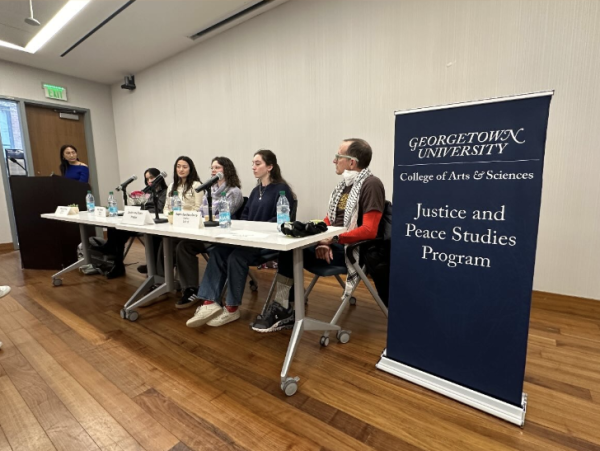Georgetown University student leaders and a professor emeritus urged community members to remain committed to activism throughout the second Trump administration at a Feb. 20 event.
The Justice and Peace Studies (JUPS) program hosted the panel, featuring four student activists and Mark Lance, professor emeritus in the philosophy and JUPS departments and Faculty & Staff for Justice in Palestine (FSJP) leader. Student organizations represented among panelists included the Georgetown RA Coalition (GRAC), the organization that represents Georgetown residential assistants in collective bargaining; Students Demand Action (SDA), a gun violence awareness and advocacy group; and H*yas for Choice (HFC), an unrecognized student organization that advocates for reproductive rights.

Lance said FSJP’s work has been complicated by the Trump administration’s approach toward activism.
“ A lot of my work, and certainly the work of FSJP, has been contrary to the policies of the past administration as well as the current one,” Lance said at the event. “U.S. imperialism is a pretty common core between Democrats and Republicans, but organizing in the context of a neoliberal managerial regime versus a fascist regime is very different.”
“ I want to say I’m not using that word lightly or loosely,” Lance added. “I did a chart recently of specific moves that happened in the first 30 days of Hitler’s regime and things that have happened in the first 30 days of the Trump regime and it’s absolutely chilling how similar they are.”
Ahead of the 2024 presidential election, an ABC News/Ipsos poll reported 49% of registered voters viewed Trump as a fascist, rhetoric echoed by then-Democratic candidate and former Vice President Kamala Harris.
Since taking office Jan. 20, Trump has fired a Biden-appointed member of the National Labor Relations Board, which enforces labor law regarding unionization, effectively preventing the agency from continuing its activities.
To preempt concerns about labor rights under the Trump administration, Miranda Xiong (CAS ’25), the interim organizing lead for GRAC, said GRAC hopes to extend its proposed contract length to four years instead of two years.
“Our initial reasoning for doing two years was because we wanted the chance for RAs to renegotiate based on whatever changes,” Xiong said at the event. “But recently we’ve also been considering four years to take advantage of the momentum that we have and let it extend until there’s another administration that comes along that’s more friendly to labor.”
Full disclosure: Xiong served as The Hoya’s photography editor from Fall 2022 to Spring 2023.
Miya Yoshida (SFS ’28), a member of HFC who spoke alongside HFC co-president Sydney Hudson (SOH ’26), said HFC is continuing to fulfill its mission of expanding access to contraception and reproductive health resources on campus.
“I think we all work together to keep each other informed on the latest news and events and policies being dropped that will affect our organization, so I think that that network protects us,” Yoshida said at the event.
“It’s kind of hard and overwhelming as a university organization that’s not even recognized by our university to think about how we can deal with something so much bigger than ourselves. At the end of the day, what makes me feel satisfied and fulfilled is knowing that I have a body and if I can go deliver emergency contraception to even one person, I’ve already done so much,” she added.
Xiong said she thinks organizers will need to consider concealing their efforts amid increased surveillance.
“ I think surveillance culture is something that’s probably going to get worse in the next few years, targeting organizers specifically,” Xiong said. “Just being more discreet, being more careful with who you’re speaking to, things like that, I think unfortunately are already becoming realities, especially as you continue to engage in organizing and as the administration continues to crack down.”
Raphaella Alioto Grace (CAS ’28), an organizer with Georgetown’s SDA branch, said SDA is focusing on building gun violence awareness on campus using cost-effective, high impact efforts such as art displays.
“We’ve been learning recently how we can do stuff where we don’t necessarily need to use all those resources to spread information,” Grace said at the event. “Last night we made soul boxes, and each box represents somebody we lost due to gun violence. We put them all together as a collage, and we’re going to hang them in The Corp.”
“Spreading that awareness at the cost of $20 for that paper shows that it’s not always about the resources, but how we use them and how we come together to demonstrate those things,” Grace added.
Lance said organizers should collaborate across issues to fight against restrictive policies put in place by the Trump administration.
“ I think it’s really, really important that we all support one another, that we all be in this together,” Lance said.